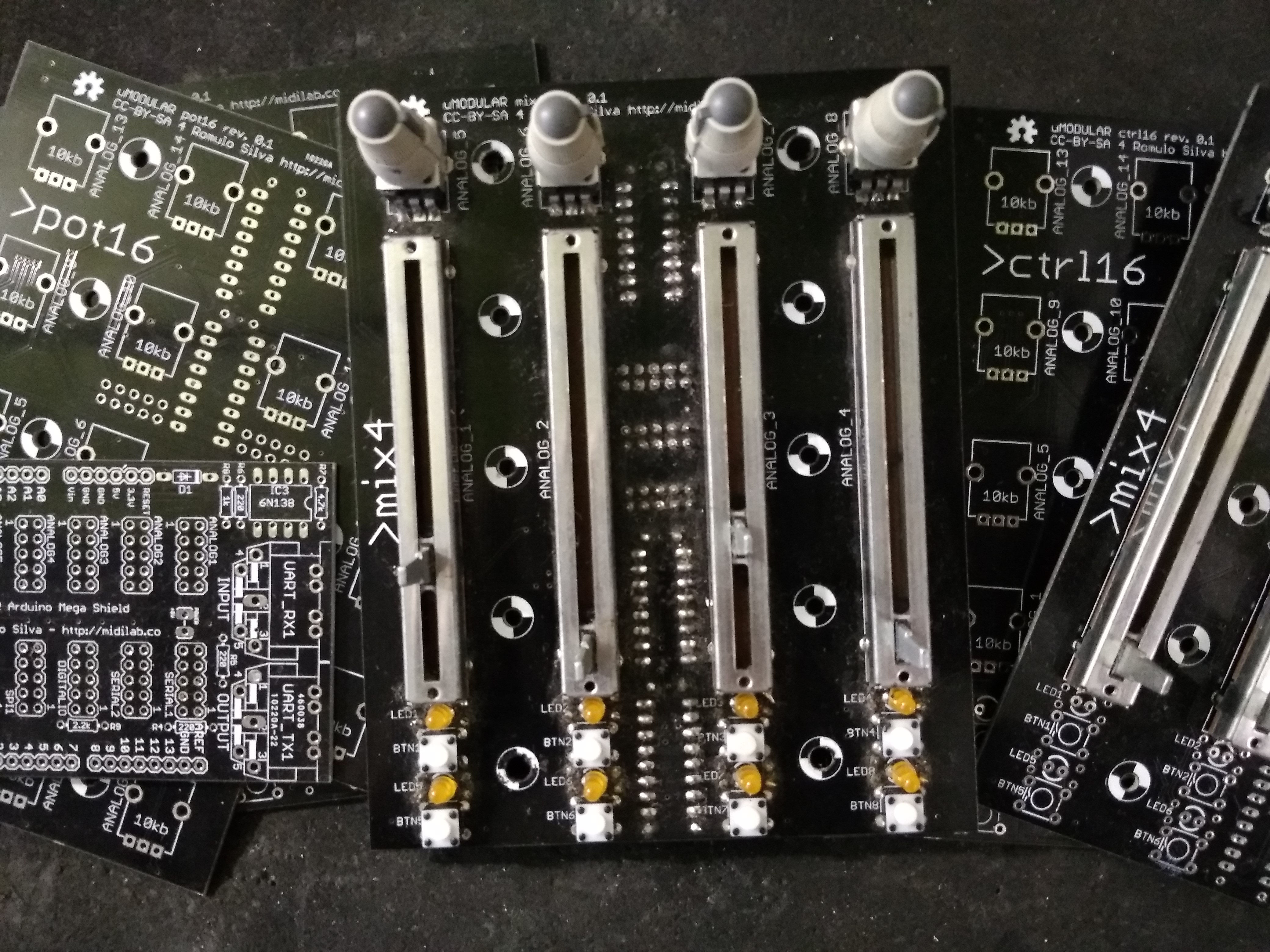
µMODULAR is your open-source launchpad for crafting unique electronic music gear. We provide a collection of modular hardware building blocks (schematics or ready-to-use PCBs) and streamlined firmware libraries, empowering you to design and build the exact MIDI controller, sequencer, instrument, or signal processor you envision.
Focus on your creative idea, not reinventing the wheel. µMODULAR handles common hardware interfaces and simplifies complex firmware tasks.
Firmware: Simplified Coding
Spend your time on creative features, not low-level coding headaches. Our firmware libraries, built for the Arduino platform (with PlatformIO support), abstract away the complexities of real-time operation, concurrency, and hardware interfacing.
- Cross-Platform: Compatible with various microcontroller architectures (AVR, ARM).
- Intuitive API: Provides safe and easy-to-use functions for handling timing (like the popular
µClock), inputs, outputs, MIDI, and more.
Applications: See µMODULAR in Action
µMODULAR provides the foundation for diverse DIY and commercial projects. Here are some examples built using its hardware modules or firmware libraries:
Aciduino V2 Sequencer
Roland-inspired step sequencer (up to 16 tracks) with deep control grid. Uses µClock and µCtrl for clock, MIDI I/O, controls, & display - by Midilab.
Atari 2600 MIDI Station
Custom live/production unit: 16-track step sequencer and advanced MIDI controller. Based on µClock and µCtrl - by Midilab.
XR-1 Groovebox
A complete groovebox demonstrating the power of the µClock timing library (part of the µMODULAR firmware ecosystem) for tight sequencing - by James Gray.
MIDI Looper
Real-time MIDI looping and sequencing capabilities, built upon the reliable timing provided by the µClock firmware library - by ymnkmusic.
MIDI/DIN Sync Box
A practical utility box for synchronizing MIDI and DIN Sync gear, showcasing the flexibility of the µClock library for timing tasks - by ymnkmusic.
Oberheim Matrix Controller
A commercial controller for Oberheim Matrix with powerfull arpergiator based on µClock - by Alpes Machines
Polyphonic Step Sequencer
A DIY powerfull MIDI polyphonic step sequencer with eurorack sync capabilities based on µClock - by savt22
ESP32 DRUM SYNTH MACHINE
A Wavetable synthesizer with 16 sound polyphony and lowpass filter, the sequencer has 16 step/pattern editor and random generators and its based on µClock - by Carlos Lopez
SIPquencer
Using an old telephone to create a functional computer music system while retaining its original keypad, handset, and circuits. Main clock engine for sequencer based on µClock - by Rolandos
Gesture Sequencer
Mudras is a Eurorack Gesture Sequencer Looper based on µClock. It can be clocked from any source like an Oscillator - by IC-Alchemy
Hardware: Modular Building Blocks
Build your device piece by piece. Our hardware modules are designed to work together seamlessly. All files are released under the CC-BY-SA 4.0 license in Kicad format, giving you full access to schematics and PCB layouts.
- Schematics: Use individual schematic modules as starting points, combining them to create your own fully custom PCB layouts.
- Ready-to-Use PCBs: Get started quickly with pre-designed, tested PCBs for common functions. Combine these modules to assemble your hardware.
MCU Core Shields
Connect µMODULAR components easily to popular microcontrollers like Arduino Mega, Micro, Mini, and potentially others.
Analog Input Modules
Add knobs and faders. PCBs like POT8 (pots) and FADER8 (60mm faders) provide clean connections for analog controls.
Digital I/O Modules
Incorporate buttons and LEDs for interfaces and step sequencers. Modules like PUSH8 simplify wiring button/LED matrices.
MIDI Connectivity
Standard MIDI IN/OUT ports are essential. The MIDI4 module offers a reliable 2-In / 2-Out configuration for versatile setups.
Getting Started with µMODULAR
Ready to start building your dream machine? Dive into the µMODULAR GitHub Repository for all schematics, PCB files, and firmware libraries.